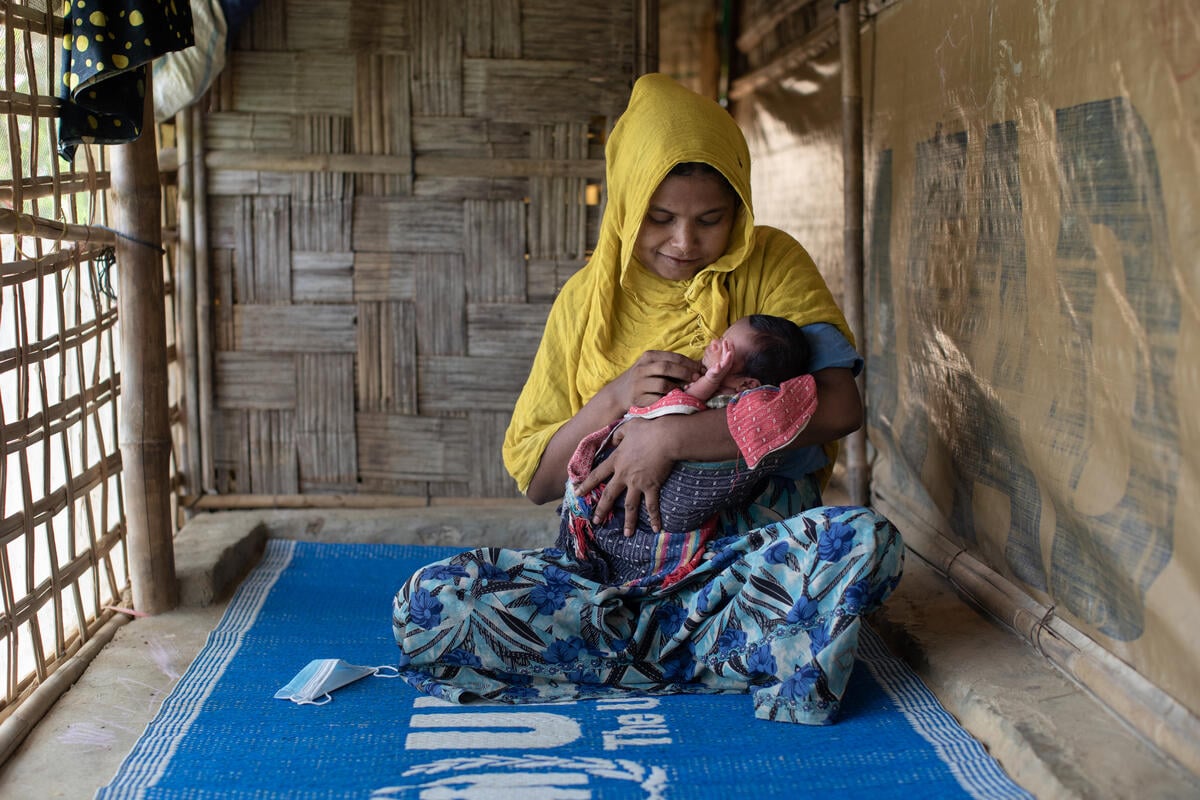Rohingya refugees living in tough conditions in Bangladesh camps
Rohingya refugees living in tough conditions in Bangladesh camps

COX'S BAZAR, Bangladesh, September 21 (UNHCR) - Dressed in black from top to toe, and holding veils across their faces, Rohingya refugee women in camps in Bangladesh press carefully folded notes into the hands of visitors, then slip away, hoping to pass unnoticed. The grimy notes reveal a disturbing tale of punishment and pain. The refugees claim they have been beaten, family books which entitled them to rations confiscated, and money extorted, often by the refugee leaders, known as Mahjees, and their followers.
"We know many claims are true and have brought this to the attention of the camp administration and government numerous times. We have asked them to stop these practices which harm the refugees who are already vulnerable," said the UN refugee agency's Representative in Bangladesh, Christopher Lee, who has photographic evidence of the beatings.
"This is a difficult protection environment for UNHCR to work in. In the camps we are doing our best to curb arbitrary punishment, such as beatings and the confiscation of family books, both of which are totally unacceptable. They have no right to stop the refugees' food," Lee added. UNHCR has a daily presence in the government-run camps and gets many requests for assistance from refugees.
The refugees have been left feeling fearful and traumatized by some violent incidents over the past year, including the murder of a Mahjee in Nyapara camp in July - allegedly over a money dispute - and an incident in November 2004, when three refugees in Kutupalong camp were killed after a power struggle. These killings led to many arrests, and several hundred other refugees fled the camp.
"Now we can't sleep at night properly because police are looking for people every night," said one refugee, who did not want to be identified.
But despite the highly charged atmosphere, most refugees still say they do not want to return to Myanmar until there is peace and democracy.
In the early 1990s, more than 250,000 people belonging to the mostly Muslim Rohingya minority escaped persecution in Myanmar by fleeing across land and river borders into Bangladesh, where most were housed in 20 camps. Since then, 236,000 have been repatriated, leaving some 20,500 in the two remaining government-run camps in the Cox's Bazar district of south-eastern Bangladesh. Their living conditions are sub-standard and they are uncertain about their future.
The government, which is not a signatory to the 1951 Refugee Convention, has always insisted the Rohingyas should return to Myanmar. But only 210 refugees repatriated in 2004, and by August of this year only about 90 refugees had made the UNHCR boat crossing over the broad Naf river back to Myanmar. Some refugees have said they were coerced by the Mahjees and camp officials to repatriate. Sometimes, at the last moment, as refugees reached the departure point for the boat at Teknaf, they changed their minds and said they didn't want to go to Myanmar after all. Their wishes were respected and they were returned to the camp.
Camp conditions are tough. Movement is restricted, and the refugees' housing is overcrowded and badly in need of repair or renewal. "When it rains, the roof leaks and we have to put out buckets and jars out to collect the drips," said one mother of eight. For the past two years, UNHCR has been asking for the necessary government permission to rebuild the camp's shelters, but so far has not met with success.
Children make up 65 per cent of the camp population, but there is little for them to do. The government only allows partial primary education in the camps. Even then, education is in the Myanmar language which is not the children's mother tongue. Instead, they speak a Chittagong dialect - the same as the local population.
Many also speak Bengali, the Bangladesh national language, but the authorities do not want the children to be educated in Bengali, because they view this as a first step towards integration in their asylum country. As a result, the hopes of young children who insist they want to be doctors and teachers are being dashed, since they have little chance of further education. The literacy rate in the camps is only 12 per cent.
While the refugees have good reason to feel aggrieved about their living conditions, the local authorities believe some of them are involved in criminal activities such as human and arms trafficking, drug smuggling and terrorism. There have been no court convictions on any of these charges, and - despite viewing them as dens of criminal activities - the government still wants to retain the camps.
While strictly speaking not allowed to do so, refugees from the camps do work in the local community - pulling rickshaws, fishing, making bricks or working in the nearby salt fields. Some have married into the local community, although this is frowned on by the authorities who fear it could compromise repatriation efforts.
"Many of these people have been here for 14 years, and it's time to have a really realistic assessment of their future and make an attempt to reach a pragmatic solution," said Lee.









